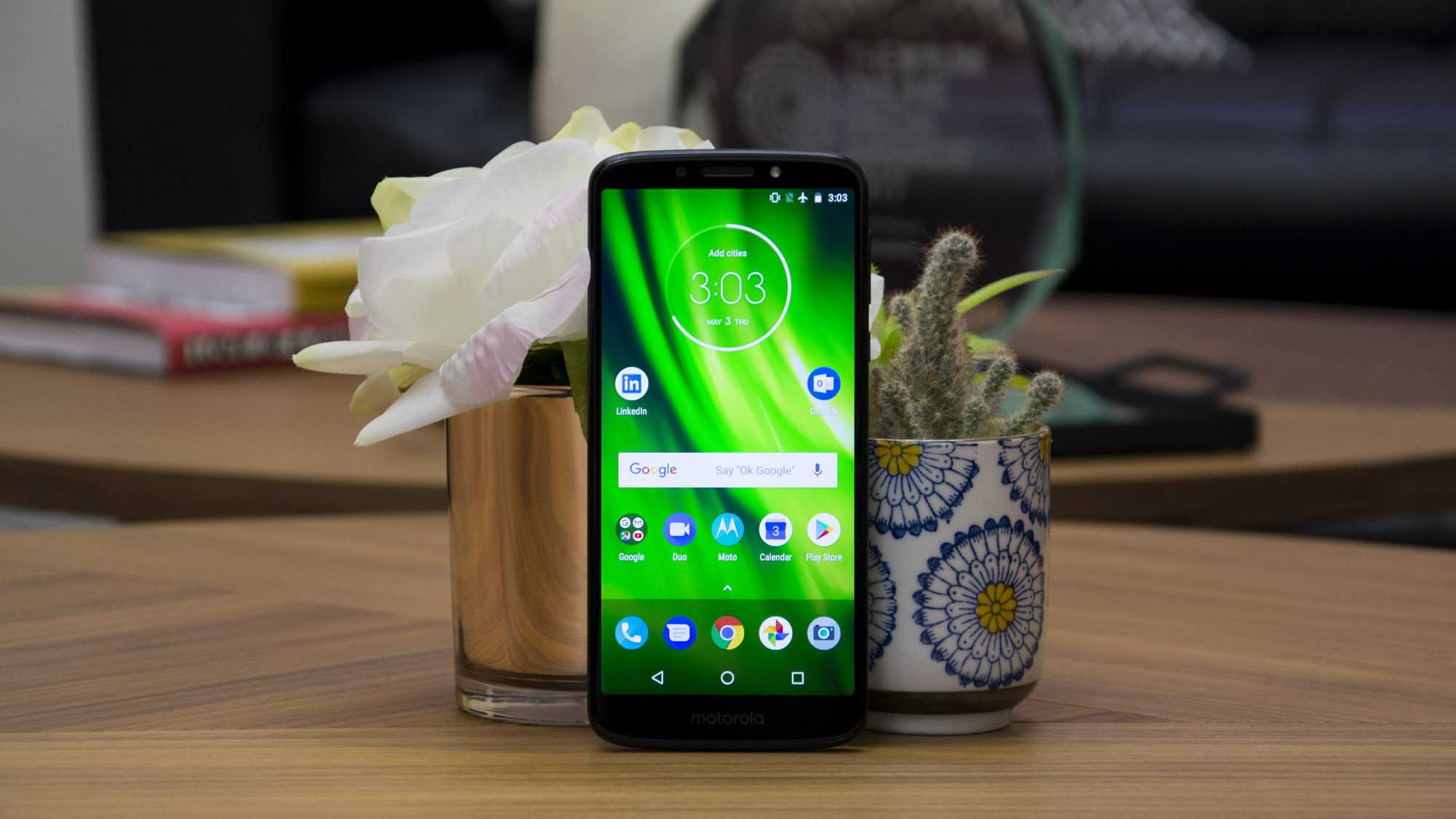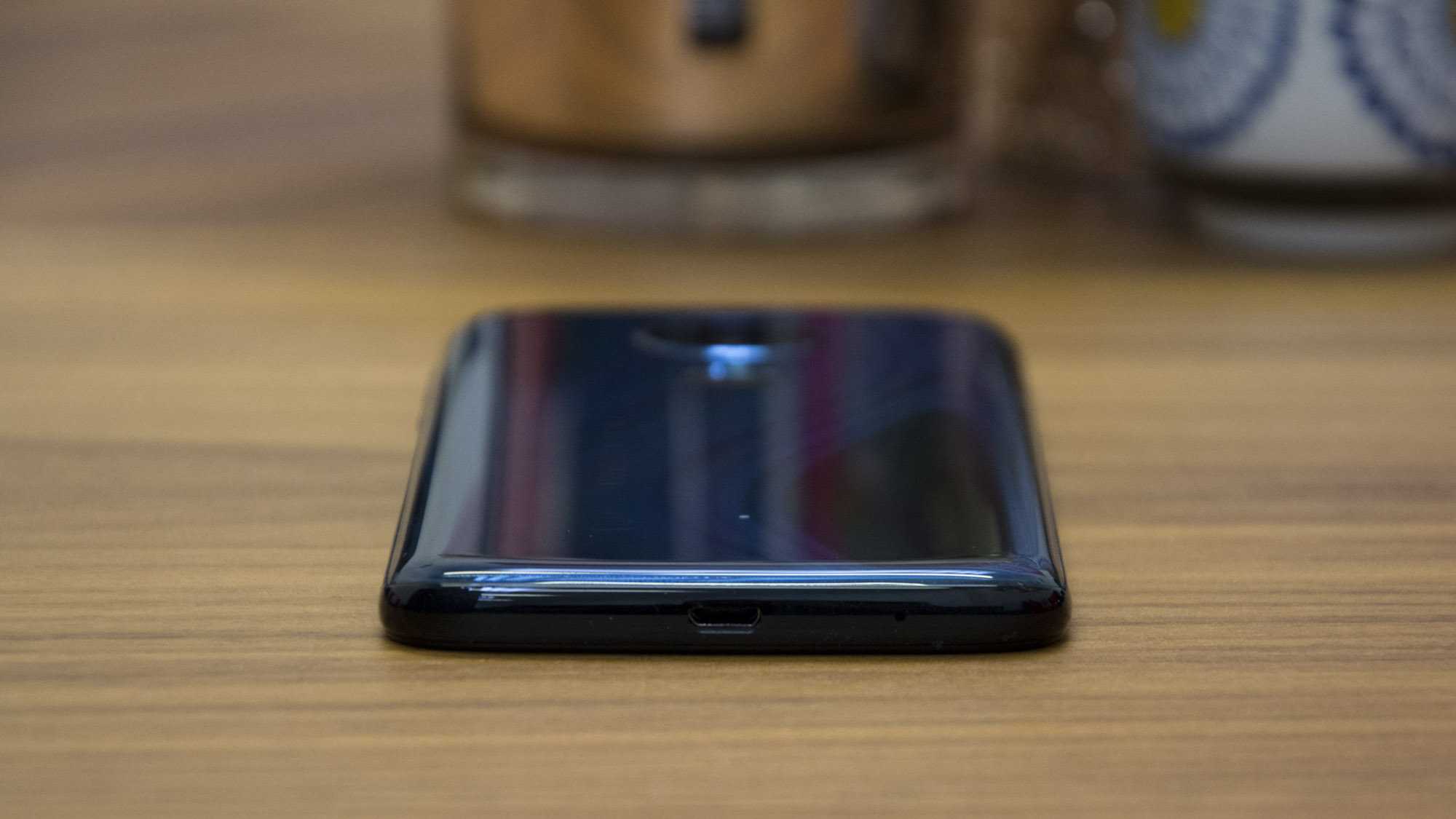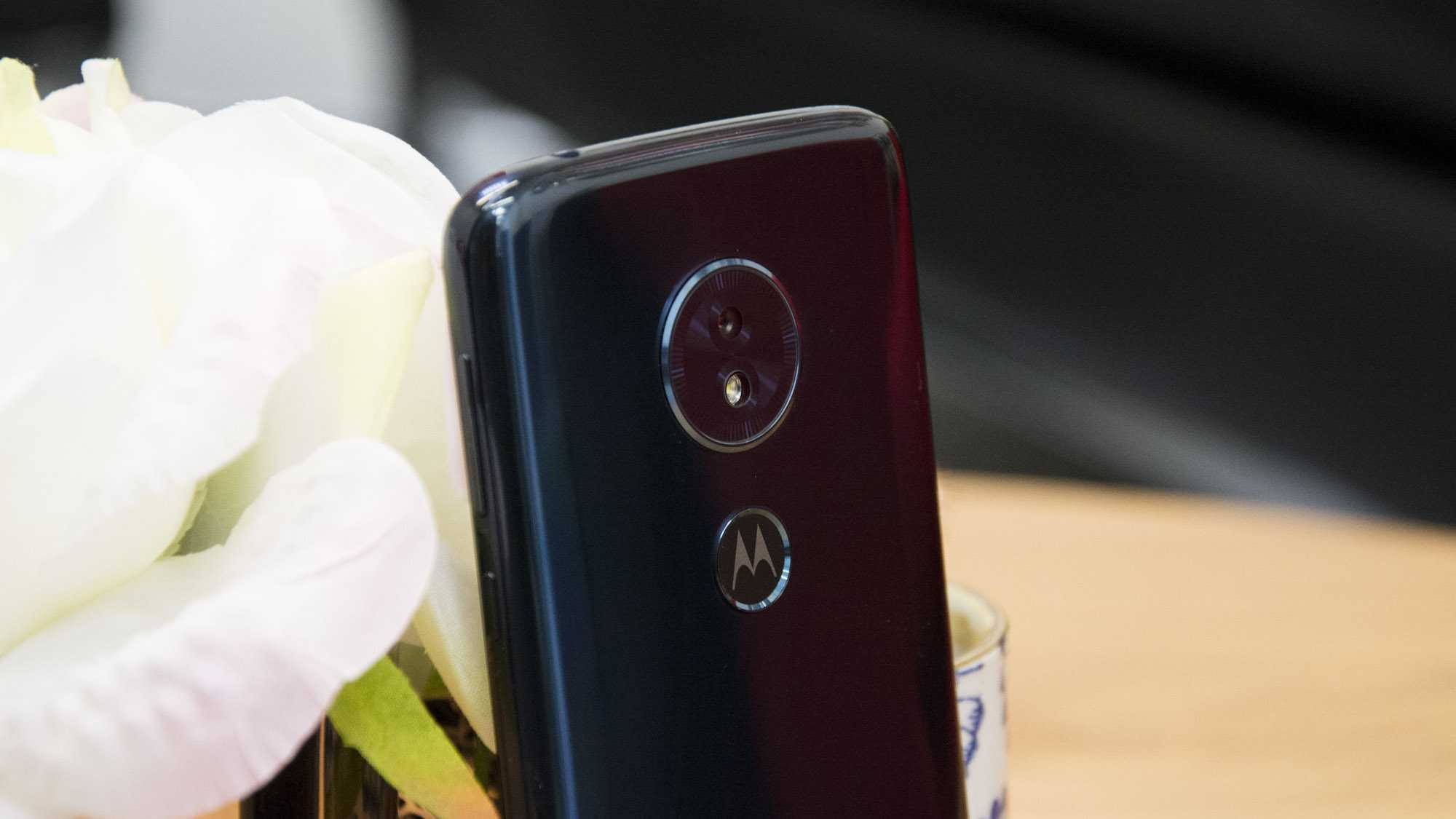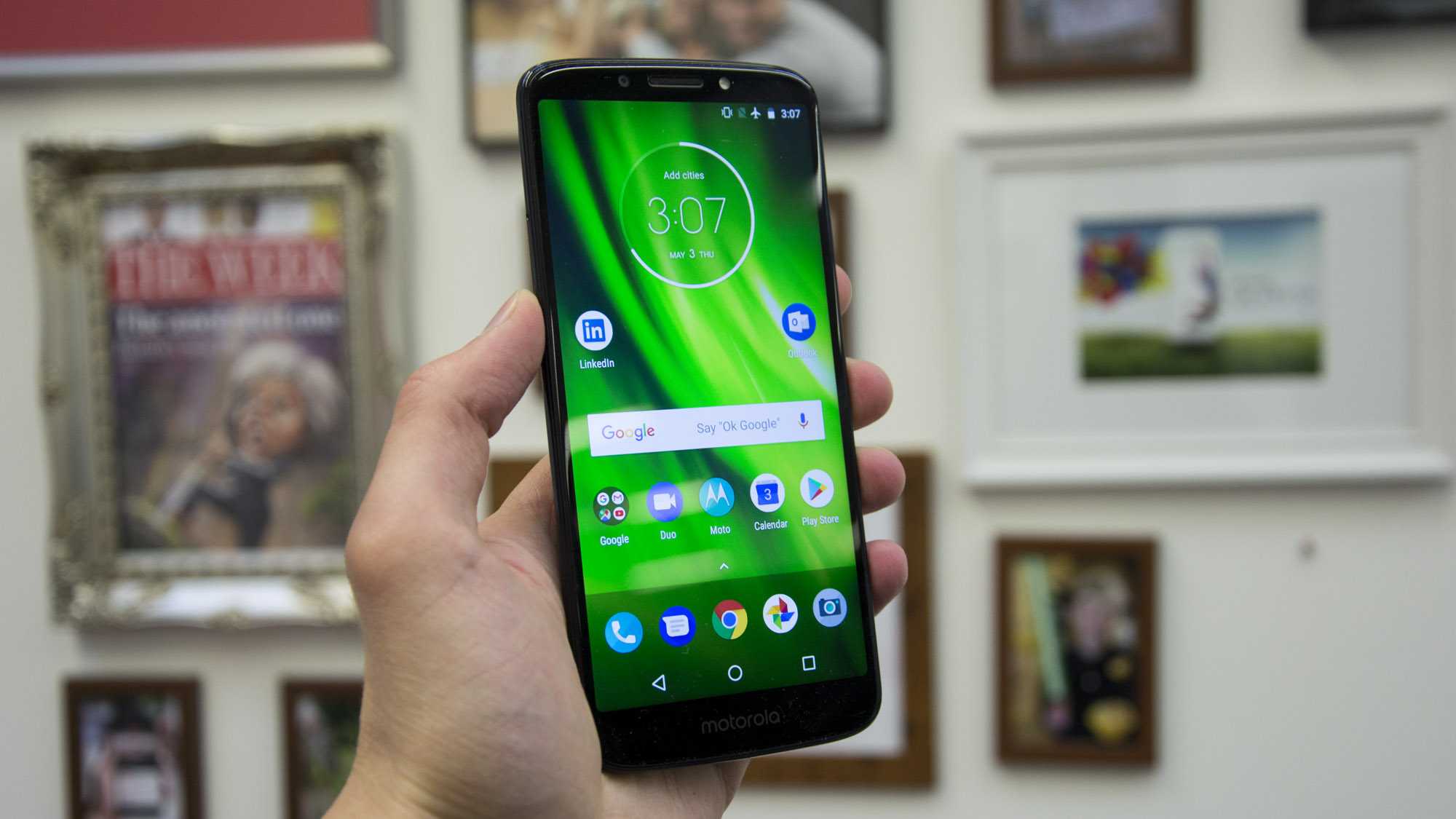It’s fairly easy to guess what a “Plus” phone might be – it’s likely to be bigger or better in some way, perhaps faster and with more features – but what on earth does “Play” mean? There's no intuitive answer.
So what does the Motorola Moto G6 Play offer that’s different from the Plus and the regular Moto G6? Simple, it's cheaper.
READ NEXT: Motorola Moto G5S review: Is this the best budget smartphone yet?
Motorola Moto G6 Play review: What you need to know
There’s a little more to it than that, of course, but the lower price tag sums it up neatly enough. It’s £169, £50 less than the Moto G6 and £100 less than the Moto G6 Plus and, yet, it looks remarkably similar to both.
There are, of course, some differences. That curved rear, finished in a rather attractive chrome in these pictures, is made from plastic rather than glass. And although the screen is still 5.7in corner to corner, it has a lower resolution. There’s no dual-lens camera, either, and no water-repellent treatment.

As you might expect of a cheaper phone, the Moto G6 Play also has a less powerful processor but, weirdly, it has a bigger battery than either of its siblings and, at 4,000mAh, it ought to deliver serious stamina. This is where the Play moniker comes in: it lets you “play” longer – geddit?
READ NEXT: Best budget phones to buy in 2018
Motorola Moto G6 Play review: Price and competition
The Motorola Moto G6 Play is currently available through Carphone Warehouse and Amazon for £159 . It can be bought on a contract, too, with prices starting at £99 upfront and £20 per month for a 12-month contract with 5GB of data per month.
As for its competitors, there’s the Moto G6 at £219 , the non-18:9 Moto G5S for around £177 , which has the same internals and a fair few non-Motorola phones as well. The Honor 9 Lite is now around £159 and also has a 18:9 display. The Vodafone Smart V8 will set you back £165 and has a Full HD 16:9 display. There’s also the Nokia 5 at just £143 and a couple of upcoming Honor handsets: the Honor 7C and Honor 7A , which are set to cost £170 and £140 respectively.
Both Honor’s budget options have 18:9 displays that run the same 720 x 1,440 resolution as the Moto G6 Play.
READ NEXT: Honor 7C review (hands on): A dual-lens smartphone with an 18:9 display at a rock-bottom price
Motorola Moto G6 contract and SIM-free deals
Motorola Moto G6 Play review: Design and features
Despite the fact that it's made from plastic ("glass polymer" in Motorola's words), the Moto G6 Play is actually pretty attractive. In fact, the plastic Play feels much the same in the hand as the glass and aluminium Moto G6 and G6 Plus. In the UK, it’s available in two colours: blue and gold.
Just like the Moto G6, the Play has curves along the long edges at the rear of the phone and a circular camera housing that protrudes from the rear, though not quite as radically as on the G6 Plus. The phone has a 3.5mm headphone jack like the rest of the G6 phones and, given that it’s plastic, it ought to resist shattering a bit better than its more expensive siblings as well.

The biggest physical difference between the Moto G6 Play and its siblings, though, is that its fingerprint reader is on the rear, just below the camera with the Motorola logo stencilled on it. A smaller, but perhaps more significant difference, is that the G6 Play has a micro-USB port on its base instead of the newer USB Type-C port, which limits the speed at which the phone can take on charge.

As for storage, the Moto G6 Play comes with 32GB internally, which can be expanded by up to 256GB via microSD. And, usefully, if you do this, you won’t have to sacrifice a SIM slot. That’s because the G5 Play has a 3-in-1 tray that lets you have two SIMs and a microSD card mounted simultaneously.
READ NEXT: Motorola Moto G5S review: Is this the best budget smartphone yet?
Motorola Moto G6 Play review: Display
The G6 Play’s display is the same size as the regular Moto G6, but the resolution isn’t as high. It’s 720p rather than 1080p and, at this size, you absolutely can tell the difference. The G6 Play’s display simply doesn’t look as crisp and it lends a slightly softer appearance to graphics and text.

Technically, though, the G6 and the G6 Play’s screens are closer together. In Standard colour mode (both phones can also be set to “Vivid”), sRGB gamut coverage is 86.3% – exactly the same on both handsets. Colour accuracy is near identical, too, with an average Delta E of 2.68 (lower is better and anything below 2 is superb).
And, while the G6 is sharp, the G6 Play strikes back with better brightness display, reaching 495cd/m² at its peak. The contrast ratio is more impressive as well, at 1,683:1.
READ NEXT: Honor 9 Lite review: A great budget phone with an 18:9 display and a dual front-facing camera
Motorola Moto G6 Plus review: Performance
As for performance, the Moto G6 Play delivers precisely what you’d expect at the price: it’s middling and not that different from its direct rivals.
What you might not expect is that the Play has exactly the same processor and RAM as last year’s Moto G5 and G5S, namely a Qualcomm Snapdragon 430 chip and 3GB.
For raw CPU power, the benchmarks return identical results but, thanks to its lower-resolution 720p display, it performs much better with games. It’s a match, in fact, for the £100-more-pricey Moto G6 Plus.
Where the Play comes into its own is stamina: the Moto G6 Play has a big 4,000mAh power cell inside. That’s 43% larger than the 2,800mAh unit in the Moto G5 and 33% bigger than the battery in the Moto G6.
And the differences in testing are clear-cut. In our video rundown test, the G6 Play lasted an impressive 15hrs 39mins, a big step up from the Moto G6’s 10hrs 45mins and the G5S’ 12hrs 12mins.
As for software, the G6 Play runs a largely clean install of Android 8 Oreo, as Moto G phones have since forever. That's unequivocally a good thing, especially when the phone's strongest competitors don't do this. In fact, it's a real point of difference between Motorola and Honor phones. Although Honor's Emotion UI is improving, it still can't match plain Android for usability or general compatibility with third-party apps and hardware.
Motorola’s install isn't entirely vanilla, though. It has a number of subtle yet practical and unobtrusive tweaks, of which gesture control (found under the preinstalled Moto app | Moto Actions) is my favourite. This is a highly convenient way to activate common functions. For example, a quick double twist launches the camera and a double chop activates the torch – it works brilliantly.
READ NEXT: Vodafone Smart V8 review: The £159 Moto G5 rival
Motorola Moto G6 Plus review: Camera
The camera is weaker than the regular Moto G6. There’s a single snapper on the rear rather than a dual setup. It captures stills at 13 megapixels, has an f/2.0 aperture, phase-detect autofocus and shoots video at 1080p and 30fps. Again, this looks uncannily similar to the camera Motorola put in the Moto G5 in 2017.
As for the results, they’re a mixed bag. On one hand, the G6 Play’s camera outclasses the Vodafone Smart V8’s by a country mile. On the other, it’s worse than the similarly priced and specified Moto G5S, which has a 16-megapixel f/2 camera.
The images above weren’t captured at exactly the same time, but the lighting conditions were similar, and it’s clear to see the Moto G5S is in a completely different class.
Indoors, the result is closer, but again the G5S comes out on top with brighter, cleaner images.
Now it looks like I’m down on the Moto G6 Play’s camera – I’m not. It’s just that, compared with the Moto G5S, it struggles. Compared with any other sub-£180 phone, the G6 Plus is incredibly impressive.
It’s head and shoulders above the Vodafone Smart V8. It beats the Nokia 5 in low-light conditions. And, as you can see from the test shots below, the phone’s HDR mode is simply brilliant, enhancing details in shadows with impressive effectiveness.
^ HDR enabled
^ HDR Disabled
As for the front-facing camera, the Moto G5S’s 8-megapixel sensor captures plenty of detail, too. And, with the addition of a front-facing flash, indoor selfies look pretty good too.
The least impressive aspect of the Moto G6 Play’s camera is its video capture, which is limited to 1080p at 30fps and with no electronic image stabilisation (EIS).
READ NEXT: Honor 7A review (hands on): Could Honor’s £140 phone steal the Moto G’s crown?
Motorola Moto G6 Plus review: Verdict
There’s no doubt the Motorola Moto G6 Play is an attractive proposition. It runs Android 8 Oreo with only a few subtle tweaks, its 4,000mAh battery is impressive and it looks amazing for the money.
Only the camera, which isn’t quite as good as the one on the Moto G5S, might give you pause. Other than this, though, if you’re on a strict £180 budget, the Moto G6 Play is the best phone you can buy right now.
|
Hardware |
|
Processor |
Octa-core 1.4GHz Qualcomm Snapdragon 430 |
|
RAM |
3GB |
|
Screen size |
5.7in |
|
Screen resolution |
1,440 x 720 |
|
Screen type |
IPS |
|
Front camera |
8-megapixel |
|
Rear camera |
13-megapixel |
|
Flash |
LED |
|
GPS |
Yes |
|
Compass |
Yes |
|
Storage (free) |
32GB |
|
Memory card slot (supplied) |
microSD |
|
Wi-Fi |
802.11ac |
|
Bluetooth |
4.2 |
|
NFC |
Yes |
|
Wireless data |
4G |
|
Dimensions |
154.4 x 72.2 x 9 mm |
|
Weight |
175g |
|
Features |
|
Operating system |
Android 8.0 |
|
Battery size |
4,000 mAh |
